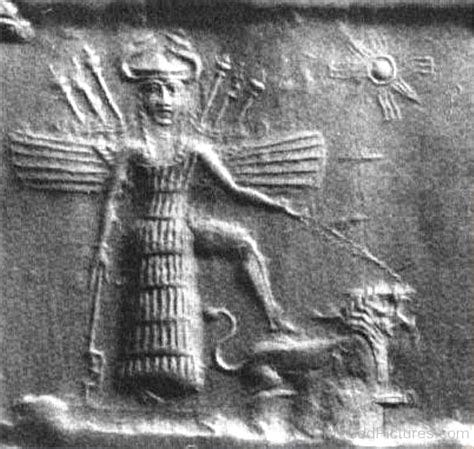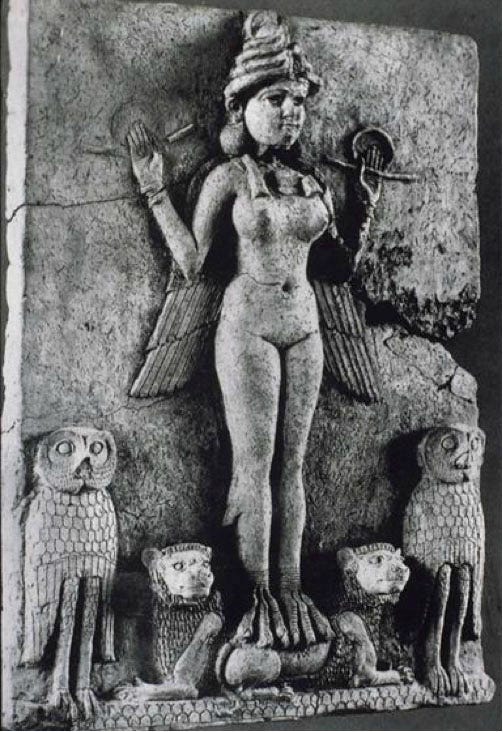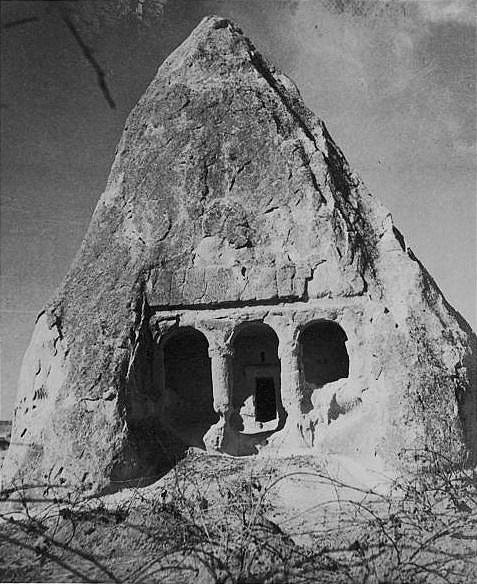Writing as Architecting the Space for the Sacred in Other's Mind
World's first known author teaches us to devote
On the October 30th 2025, Headwaters 6-week long writing course begins! We will work through creative blocks and dive into authentic writing. You can find all the information about the course here. 𖦹
A writer who does not share her words is no author at all; it is only when others read, repeat, hear, sing, or copy a text that their creator can claim authorship. Becoming an author is to surrender one’s words to the care and craft of others. It requires conversation and collaboration, not as a mere practicality but as a foundational necessity.
— Sophus Helle, Enheduana
“My honey mouth is full of froth, my soothing words are turned to dust.”
The first known author in our civilization became an author by entering into a relationship with a goddess. The first known author in our civilization became an author by starting a conversation with the ineffable. The first known author in our civilization became an author by devoting herself to something bigger than herself. The first known author in our civilization was a non-white woman.
Enheduana was a poet and a high priestess of moon god Nanna, appointed by her father, Sargon of Akkad, the first Sumerian emperor and ruler of the city Ur (present-day Iraq). She lived around 2300 BCE, in a time of social unrest and political transformation that turned history. Some profess Enheduana being a vision holder, a trailblazer for other women writers, others see Enheduana as her father’s political device, meant to unite his imperial city-states through poetry.
Her best-known work, Exaltation of Inana1, was born from a time of uncertainty, occupation, despair, and desire for liberation. At the time of her father’s dynasty, the city of Ur becomes usurped by Lugal-Ane, a rebel attempting to overthrow the reign of Sargon. Lugal-Ane demanded that Enheduana, as the high priestess, approve of his rulership over Ur. She did not back down and fled her city.
In the desperate upheaval of exodus, Enheduana reached out to the god Nanna, who was the moon god and appointed god of Ur. The moon god did not respond to Enheduana’s plea, and so, the high priestess turned towards Nanna’s daughter—Inana.
Enheduana birthed these poems as an offering to the goddess of love, war, fertility, and political power. She humbled herself in front of one who could bestow the good fate. But her appeal to Inana was not just a poetic expression of appreciation — it was a work of exalting the goddess to a new status in the Sumerian pantheon.
Enheduana became an author by devoting herself to the goddess Inana. A woman of the highest status and privilege in the empire fell by the feet of the goddess; transforming herself into a creative whose only mission is to praise Inana and make the world known of her prowess.
Enheduana kept her promise, even if it was not completely up to her. She exalted Inana and through her poems, she convinced generations to worship the goddess through the centuries.
In the eyes of the high priestess, Inana transforms into the ultimate goddess. One who seeps into every corner of existence, one who can make the impossible possible, one who can bend dualities. Other gods of the world fall silent when Inana raises her eyes. She is the final resort for Enheduana.
May this song be recited
before you! This
is my offering to
you: to proclaim
your great divinity
across the land. I
know your great
burden from my
own body. Grief
and evil keep my
eyes open, the pain
spills out. But pity,
compassion, care,
mercy, and grace
are also yours, as
is the flooding of
rivers, the breaking
of hard soil, the dark
turning into light.
My lady, across the
lands I will magnify
your majesty, I will
praise your path’s
supremacy. You!
Who can compete
with your divinity?
Who can rival your
rituals?
— Hymn to Inana, excerpt. Translation by Sophus Helle
The world’s first-known author was not afraid for her work to be known by the world, and especially—the gods. She was not hiding. She was not devaluing her work, the contrary.
Her poetry was her only and last resort for her own survival. Not only literal survival, but glueing together her father’s reign and living on as a high priestess—poetess in the ages to come.
Imagine writing in a way that can save your life. Imagine devoting yourself through your words in such depth that your fate can change.
In the poems, Enheduana incantates her work to be spoken aloud by a ritual lameter. She knows that her poems will be recited. She knows they will be read, rewritten, and even changed. Enheduana is not afraid of that, her life depends on her work and poems reaching as many as possible. And the most important recipient is Inana.
There are two texts, The Exaltation of Inana and Hymn to Inana that we know today. Both of them were said to have been written by Enheduana when she needed aid and guardianship from Inana. However, the only remnants of these texts have been produced hundreds of years later after Enheduana lived. Clay plates that are found in cuneiform (Sumerian writing), were produced by students and scribes, learning and re-writing the hymns as part of their old Sumerian education. Many of them — translated, re-written, altered to one’s liking, enriched with metaphors and new plays on words.
As Sophus Helle writes:
‘Exaltation’ makes a crucial claim about authorship—namely, that it is born out of dialogue. The poet is not shown as an isolated figure who scribbles away in a candlelit chamber, or meanders alone in a far-off meadow when inspiration strikes, or recites her song while the audience listens in silence. Enheduana becomes an author by conversing with Inana and by engaging other people in her poetic creation, including the lamenter who repeats her words and the scribes who copy them out.
High Priestess in the Other’s temple
With your words, you enter a temple of someone else’s mind, heart, and body. You place your ideas on cold flat stones, etched into walls. They become absorbed through glimmering portals — windows that cast light into the interior of the temple — the eyes. You enter into the temple as wind, through coiling holes that warp sound into melodies — the ears.
Writing is a transmission that builds. Writing is a transmission that enters the temple.
When someone reads what you have written, it will change their mind, perhaps forever. Even if they forget what they have read. Words change the inner structure of the reader.
Writing can become a sacred practice, but it is not sacred by default. It is a writer’s responsibility to create an energetic space that can contain it.
Modern society has desecralized everything that came in its way. Devotion is not what a modern person does. We are left alone to make meaning out of things we do, and when meaning is pulled right from underneath us—we lose our footing.
We have desacralized the Earth, the trees, the stones, the animals, and the people. We don’t address the ineffable in our daily thoughts. We are void of rituals, beauty, and adhering to the meaning of space. We are left with collective rituals that happen several days in a year, surrounded by angst and loneliness. When we explore new places on Earth, we enter as if we were invited—without addressing the genius loci, the protective spirit of the place—and leave with a trace.
To hold something sacred is to recognize the inherent meaning, importance, and virtue of that thing. There is no extractive agenda. There is an understanding that it’s not for us to judge the deservingness of something to exist, and not for us to desacralize it.
The quality that I have noticed that brings the sacred into the center of your work is time, spaciousness, and intention. Sacred work is one that asks you to warp time against the rapid currents of everyday life. It asks to clear space from the unnecessary—to purify the channel that interacts with the message and the image. Above all, it demands intention and attention. The message first must move through you, to reach another. The sacred must first enter your temple before it travels on to the next.
Questions to work with when inviting the sacred into your writing practice:
Prepare your space. Clear the space physically, mentally, and energetically. Is there room for new ideas to come to you, when the area around you is occupied? Bring in objects that will support your practice. I like to light a candle, burn Tibetan incense, put on music that will keep me in flow, and make matcha before I write. No distraction is allowed.
Who am I inviting into this space? Beyond my own mind and body, who and what is invited to join this act of transmission? Who do I call upon to help me bring this message forth? Who’s help do I need?
Why am I writing this? Why this message and why is it important? When you begin your writing, note this down first.
To whom is this message dedicated to? Who is the receiver? Imagine them reading your text and how it enters their mind-temple.
On the October 30th Headwaters 6-week long writing course begins! We will work through creative blocks and dive into authentic writing. You can find all the information about the course here. 𖦹

The playlist I keep coming back to:
Inana, also spelled Inanna. Similarly, Enheduana also is sometimes spelled Enheduanna. Borrowed from Sophus Helle’s translation.






YES YES YES ! I so resonate with your lens …loved the metaphor of writing entering someone’s temple. Although I always pray and meditate on what wants to live through my writing (as I consider my work to be a devotion to the Feminine Divine) I never thought about it entering the actual temple of another. How beautiful. Thank you for this piece 🌹✨ What a blessing it is to write!
This is a beautiful ode to the sacred in writing ✨️